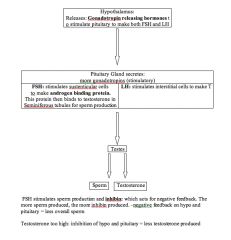![]()
![]()
![]()
Use LEFT and RIGHT arrow keys to navigate between flashcards;
Use UP and DOWN arrow keys to flip the card;
H to show hint;
A reads text to speech;
15 Cards in this Set
- Front
- Back
|
External sex organs of male: 5
PPPSG |
1. Penis
2. Perineum 3. Prepuce 4. Shaft 5. Glans |
|
|
Expand on function of penis.
Erection. How erection happens. What happens after orgasm? |
1. copulatory organ. enables coitus/sexual intercourse
2. erectile organ: stimulated for an orgasm to take place 3. erection: penis engroged with blood. cavernous tissue (vascular tissue) fills up. 4. after orgasm: bloow flow out of vascular spaces, penis flaccid |
|
|
How penis gets engorged.
nervous system involvement. what substance assists in erection and maintaing it? |
1. parasympathetic reflex. emotions stimulate central NS-->activate PNS
2. Nitric Oxide: stimulates relaxation of smooth muscle of blood vessels. Nerve endings→into penis→blood vessels dilate. When filled, epithelium cells surrounding the vessels released nitric oxide to maintain blood flow. |
|
|
Ejaculation. controlled by which NS?
|
controlled by sympathetic NS. contraction of smooth muscle in pathway of sperm.
also closes sphincter from bladder so no urination. |
|
|
Before orgasm. Symptoms
|
build up of muscle tension, increased heart rate, increased blood flow to reproductive organs (results in increased BP)
|
|
|
After orgasm. Symptoms
|
relaxation of muscles, arterioles constrict--flaccid again
latent period: refractory period: body unresponsive for another erection. increases with age |
|
|
Impotence, what causes it. (8)
Meds that help prevent it |
1. sometimes psychological
2. age--men over 40 3. problem with blood supply 4. prostate surgery -- nerves cut 5. diabetes mellitus 6. high cholesterol 7. high blood pressure 8. some meds: blood pressure meds, antidepressants, cocaine, weed, cigs, heavy alcohol. meds: viagra and cialis--increase nitric oxide for more blood flow to penis. |
|
|
Overall scheme of testosterone regulation
|

|
|
|
if Testosterone too high?
|
negative feedback on hypo and pituitary gland:
inhibit hypo to stop producing releasing hormone (RH) inhibit pituitary to stop LH production. Shut off RH and LH = no more testosterone production. |
|
|
If T too low?
|
more RH and more LH→more testosterone.
|
|
|
Sperm too high?
|
negative feedback. When FSH stimulates too much sperm, also stimulates inhibin released from seminif tubules.
Inhibits hypo’s and pituitarie’s production of RH and FSH |
|
|
Sperm too low?
|
more RH and more LH and more FSH.
|
|
|
How does T affect body?
7 points. |
1. development in utero: vital for development of male internal and external genetilia. If there’s a Y chromosome, directs T production to get male genetilia.
2. Stimulates Spermatogenesis in testes 3. stimulates growth, development, and functioning of the secondary sex structures 4. Body growth- anabolic steroids stimulates anabloism- bone growth and density. Some of the T converted to estronge. Estrogen stimulates calcification of bone. Increases muscle size and mass. 5. Increase metabolic rate 6. Affect behavior- libido- sexual desire (in both men and esp. women). Affects amygdala in brain. 7. Feedback regulation on pituitary gland |
|
|
Testosterone can be converted to what steroid?
What is this steroid necessary for? |
di-hydro-testosterone
necessary for: 1. development of secondary sex characteristics 2. prostate fxn |
|
|
Abuse of anabolic steroids.
5 points. |
1. type of T abused to build muscle. But results in negative feedback on a man or acts like female hormones.
2. so much T present, do not make normal amount of hormones. FSH and gonadotropin horone stimulate growth cells so testes shrivel and infertility present. 3. RH, LH and FSH decrease so low sperm count 4. Inhibits RH and gonadotropic hormone. 5. In females, gonads are going to be inhibited. |

